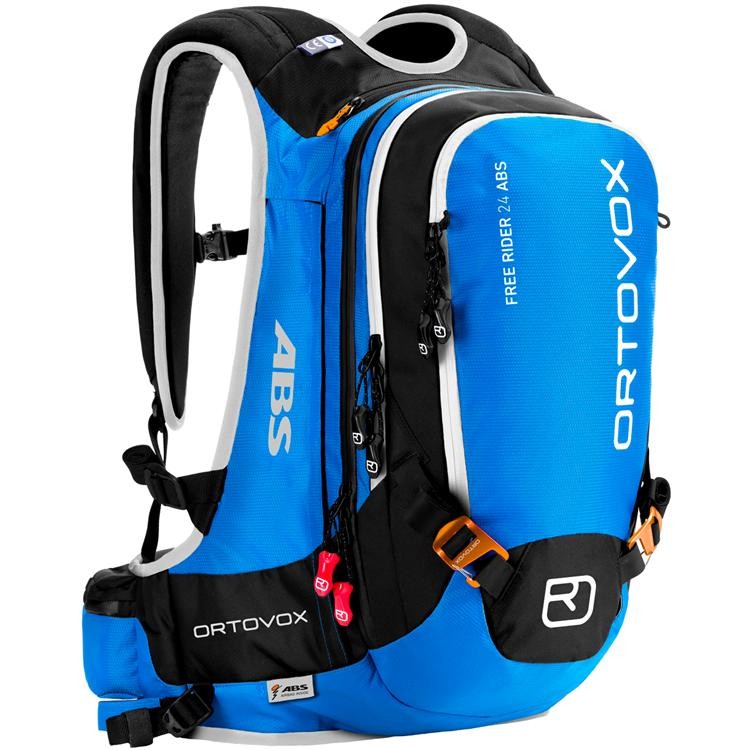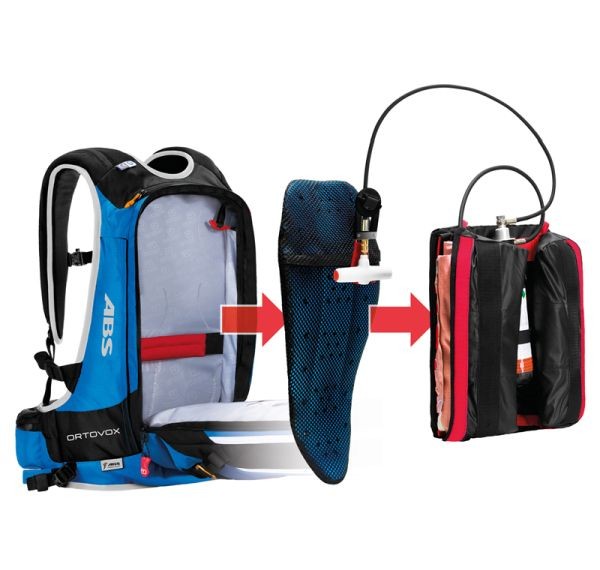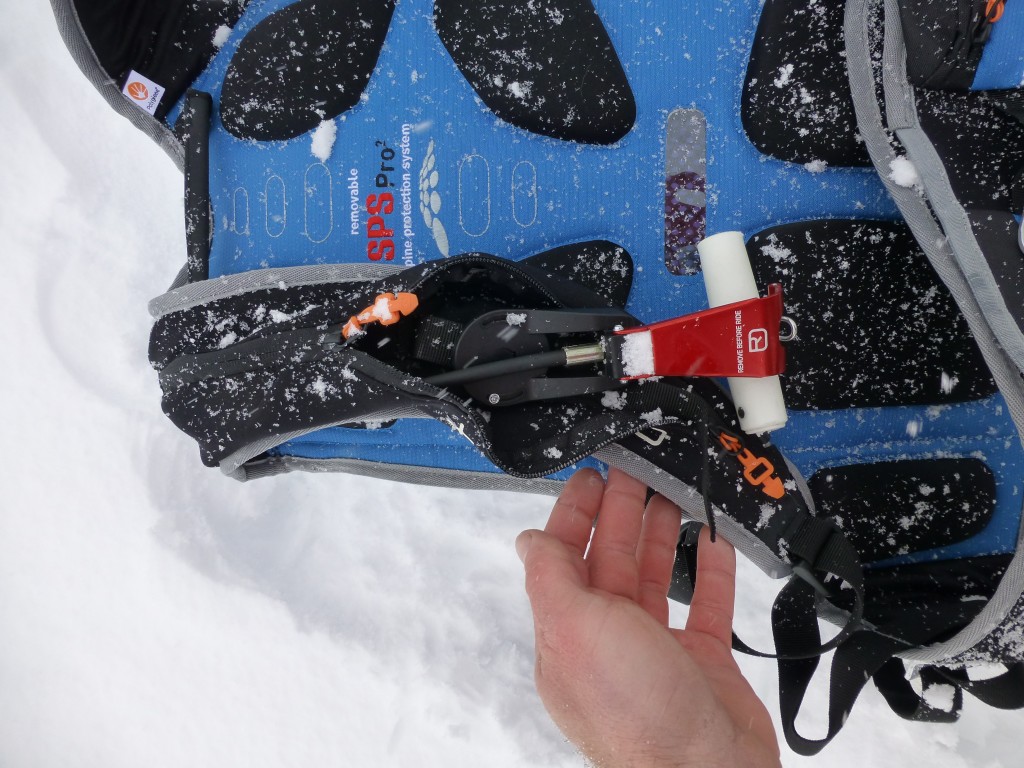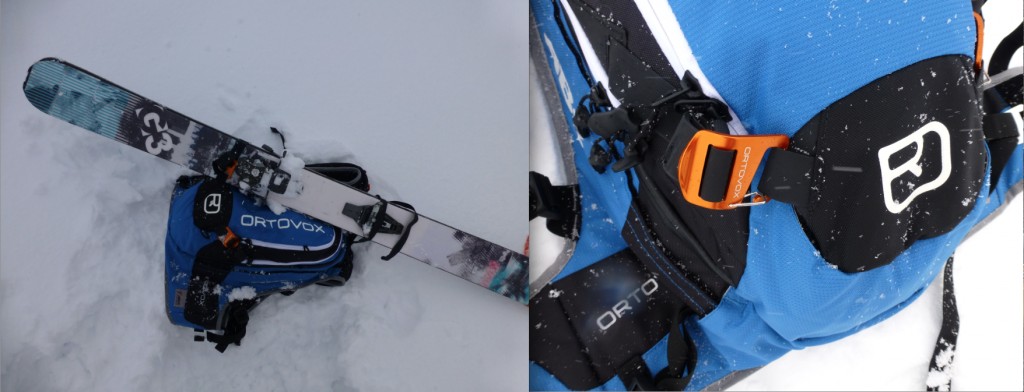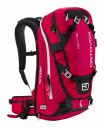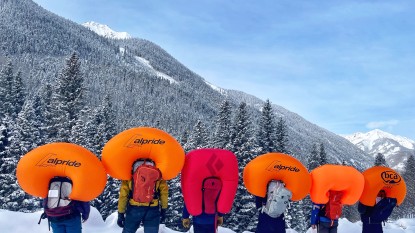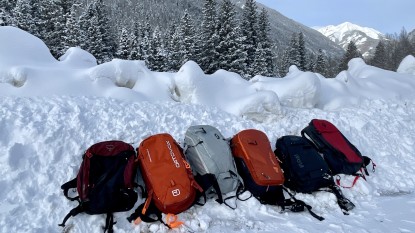Ortovox Free Rider 24 ABS Review
Our Verdict
Our Analysis and Test Results
Airbag Features
The Ortovox Free Rider 24 ABS pack uses the ABS airbag technology, which is our favorite system. The ABS system is the only airbag system we tested to use two airbags instead of a single bag to keep the user on the surface. The redundancy of two airbags adds a level of safety in case one doesn't inflate or is punctured. The double airbag system uses two 85-liter airbags for a total of 170 liters of volume, which is the most of any airbag on the market. Ortovox uses a modular system called the MASS Unit that makes the airbag system interchangeable between Ortovox packs.
The MASS unit used in the Free Rider 24L is Ortovox's version of ABS's Vario system and Mammut's RAS (Removable Airbag System) and PAS (Protection Airbag System) interchangeable systems. The MASS unit itself weights 2 lbs 13 oz and is easier to switch between packs than the Mammut PAS. The MASS is a little more expensive at $700 while the PAS costs around $600. The compressed nitrogen canister is not included in this price. The MASS costs $280 less than the ABS Base Unit, which retails for around $980. After buying the MASS unit and the cartridge/trigger ($180), each additional pack will run you around $300-$320. These packs are very similar in price to the Mammut PAS packs. The RAS unit is $100 less but doesn't have the horseshoe-shaped airbag that protects the head and neck. The ABS Vario Zip-on packs are much less expensive, running around $80-$140 per pack.
The trigger handle of the Ortovox Free Rider 24 ABS is modular so it can be worn on either the right or left shoulder strap. The Free Rider 24 ABS also allows you to run a hydration system on the strap opposite the trigger. Something really cool and unique to the Ortovox is the metal clasp on the trigger that keeps it from accidenly triggering in a car, gondola, or helicopter.
Refilling Options
ABS uses compressed nitrogen the fill the airbag, which is significantly more costly and more difficult to refill compared to compressed air. Compressed air cartridges all use a pretty standard fitting and can be refilled at most scuba shops, paintball shops, some fire stations, and some outdoor gear stores. Getting a charged nitrogen canister for the this pack is more complicated. In many major cities and outdoor and back-country oriented towns you may find a retailer to perform a canister swap, where you pay $40-70 to turn in your used cartridge and trigger in exchange for a new set. Why can't you simply refill your canister with nitrogen? Because the trigger mechanism in the ABS uses a piece of metal fired at high speed to puncture the cartridge which fills the airbag. Once deployed, the trigger no longer has its explosive mechanism and needs to be replaced.
Travel ConsiderationsThis is where the ABS airbags have their biggest downfall. The TSA won't allow nitrogen canisters either empty or full on commercial aircraft, even in checked luggage. The only option, if there isn't a location at your destination to perform a cartridge and trigger swap, is to pay a hazards material fee and have your canister shipped to your destination. This fee can range from $25 to $70, depending on the location. Paying this fee allows the canister to be shipped full ahead of time.
Comfort and Fit
The Ortovox Free Rider 24 ABS Airbag Pack hugs tightly against your back and moves with you wonderfully well. It only comes in one frame size that doesn't fit a huge range of sizes. We think it will fit most people between 5'7" and 6' tall. While this model only comes in one size, Ortovox offers a women's version that is the same pack but is supposed to fit a shorter torso. Ortovox also offers the Free Rider 26 ABS, which is the same pack with a one inch longer frame. We love the neoprene Ortovox uses on the inside of the shoulder straps and waist belt. Not only is it comfortable, but also keeps the pack from sliding around on our back.
Backcountry Pack Utility
Rideability
Rideability is a measure of how well the pack carried and moved with you on the down while skiing or snowboarding. The Ortovox Free Rider 24 ABS Airbag Pack hugs tightly to the back, which prevents delayed swing weight, making it excel at skiing steeper terrain. A few smaller-framed testers found the Free Rider ABS 24 a little stiff, but most testers loved how well the Free Rider moved.
Carrying Skis or Snowboard
There isn't a great way to strap a snowboard onto the Free Rider 24. It does have the ability to carry skis two different ways: both a traditional diagonal carry and an X-frame, which is a style that's unique to Ortovox packs. At first we thought the X-frame was a little gimmicky but it carries better than expected. Carrying skis in this orientation makes the skis twice as likely to get hung up than in the more traditional diagonal orientation since there are four points sticking out rather than two. Above the tree line or in easy terrain we liked the X-frame, but in more technical or forested terrain we'd stick to the traditional diagonal carry.
Overall Cost Breakdown
The cost of avalanche airbag packs can be confusing because some manufacturers include the cartridge in the price while others do not. Make sure you know what you are buying. With the Free Rider ABS 24L you can buy the whole unit together for around $1150-$1200 or you can buy the MASS unit ($700), the canister ($180) and the pack separately for $300.
Weight
One of the heaviest packs in the sub 30L range, the Free Rider ABS 24L checks in at 6 lbs 15 oz. It is heavier than both The North Face Patrol ABS 24 (6 lbs 9 oz) and the Backcountry Access Float 22 (6 lbs). The modular airbag system and removable spine protector are both nice features which might be worth the added weight. It's also worth noting that the spine protector is removable, which will bring the weight down around 8 oz. Overall the Free Rider 24L is only slightly heavier than average.
Best Application
The Free Rider is best for heli, cat, or side-country skiing. It doesn't excel at touring because the MASS system takes up so much room in this small pack that it just can't hold much stuff. It is also well suited for mechanized based adventures because of features like the spine protector, awesome goggle pocket, solid fit and ride-ability.
Other Versions
Ortovox Tour 32 + 7 ABS Pack
- Cost - $1,200
- Super comfortable
- Great option for long tours
- 32L capacity with additional expandable 7L main pocket


